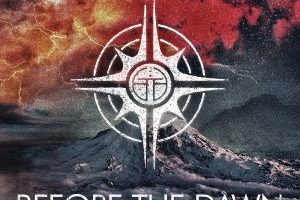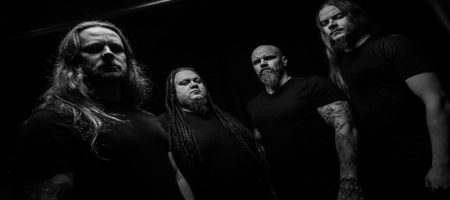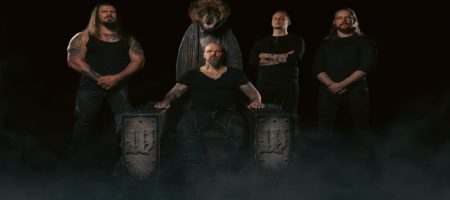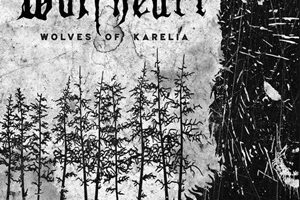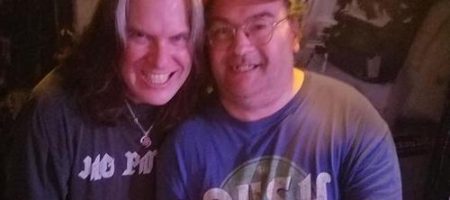Wolfheart – Fire and Chaos
Thursday, 16th April 2020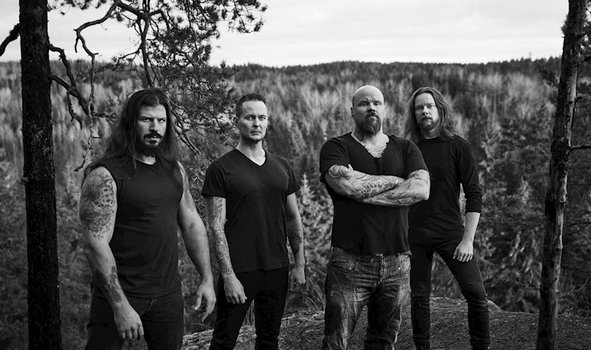
Finnish melodic death/black act Wolfheart have been very productive over the past seven years. Wolves of Karelia is their fifth album already – and their touring schedule has gotten busier and busier as the demand for seeing them live increases. Finally gaining the opportunity for their last studio album to tour North America twice, it’s evident that the band’s fusion of aggression, melody, and passion ring true record to record and gain acclaim, admiration, and respect from the metal hordes.
We reached out to guitarist/vocalist Tuomas Saukkonen, just as the band’s Devastation of the Nation tour got postponed to 2021 due to the ever-present COVID-19 pandemic. We talk a bit about that during our Skype interview, as well as the band’s guitarists shuffle, the Finnish/Russian conflict during World War II which shapes the lyrical themes for the new album, and frank discussion about the melodic death/extreme scene and thoughts on newer bands output versus the veterans.
Dead Rhetoric: Wolves of Karelia is the fifth Wolfheart studio album – and first for session guitarist Vagelis Karzis, who is now a permanent part of the band. What took place in the interim for Mika to step away, and where do you see this record in terms of feel, atmosphere, and Wolfheart’s history compared to the previous discography?
Tuomas Saukkonen: Mika started to have a lot of scheduling issues. He has a job, he went back to school, and there was a lot of health issues. He had huge pressure in multiple directions basically over the last two years. He only did one tour in that whole period of time. It started to stress him out greatly, and it was complicated for us too. We would have to wait until the last minute and then schedule a session player for the tour. We decided together that it’s a better thing for him to step out. It wasn’t an easy (decision) for me because he was the first guy I ever asked to join back in the early days of Wolfheart. He’s the only guy playing on the first album besides myself- he did all the guitar solos. To me, he was like a partner from the very beginning. But then again, life happens. You can’t create those schedule issues. But we now have Vagelis.
When I compare this new album to the previous ones, the biggest difference is it’s the first actual theme album. The lyrics focus on the second World War time and the winter war we fought against Russia. That theme had a big impact on the musical part this time – usually I write the songs and then decide the lyrics and the theme of the individual songs. When I knew this time what I was going to write about, the album got a little bit more heroic and the music got a bit more aggressive for the album.
Dead Rhetoric: Tell us about the video shoot for “Hail of Steel” – do you ever get scared of being surrounded by fire during these shoots of any weird mishaps, and do you believe that videos have been very important to getting across specific images and messages within the lyrical content of the band?
Saukkonen: I do think that the videos are very important for us. I don’t think the music or any album would be really complete without the music videos. I love movies and music videos, that’s how I grew up starting to know about bands is through Headbangers Ball for example. To me it’s important to introduce the band with music videos and the visual aspect. It started to get complicated a little bit with fire this time. It is a little bit of a chaotic element, and I don’t want to use the stage pyro with gas because it looks industrial to me. Everything becomes too timed, a bit too industrial, too nice and well-planned. Fire needs to be chaotic and the element of chaos. When you are standing in the middle of the element of fire, it’s chaos and things can happen.
We didn’t have any mishaps this time, but when we did the “Breakwater” video, we ended up burning six Marshall cabinets and all the plastic parts off our drummer’s drum set. Basically it all melted away. Almost causing a few yard fires. We learned a lot from that video, so it’s a little safer now. The backline company was very, very unhappy when I was returning the Marshall cabinets. They wanted a good explanation as to why the cabinets are melted because we only had the water hose to put out the fire on these cabinets. I have a long history with that company and luckily it didn’t cause any permanent damage. I got very tight instructions for the later video shoots of what to do and not to do with their stuff.
Dead Rhetoric: Beyond nature, many of the lyrics handle facets of battles, wars, and insights from a soldier’s perspective. Can you discuss your thoughts on wars throughout history and why this continues to be a favored topic in Wolfheart lyrics – do you believe it matches up well to the intensity and dynamic diversity the music presents?
Saukkonen: It’s not that I glorify wars at all – but the war themes we have on these albums are based on the World War II era. It’s not that long ago when it happened, and it’s very remarkable when you look at the war history in general how this small Finnish army was able to stop this huge Russian army. During one of the coldest winters of that time. The environment was super rough, and if you look at the numbers, Finland has 32 tanks, and the Russians had over 3,000. It makes no sense how we even stopped any of their attacks. They had almost 4,000 planes against our 114. The odds were badly against us. The soldiers had no proper anti-tank weapons, so they just started inventing their own.
One thing they did, they saw the tank coming so they had these huge logs that they carried and jammed into the tanks. Without actual weapons, they knew this is the only thing they could do to stop them. It’s very inspiring to Finnish people – there are still people alive, the veterans from that war. It’s something that’s close to Finnish people, and that’s the war that I keep bringing up. I just choose to use different words or acts or places – because I don’t want to be like Sabaton. I want to camouflage the war thing a little bit to something else, like this warrior thing. That’s the reason why there’s no war elements on the cover, I didn’t want to underline it to much. I go back to this theme on every album – on the first album I have the song “Ghost of Karelia” which is about the same war. On Tyhjyys there is the first song “Shores of Lake Simpele” which is the lake where I grew up in the Karelia region, the village is only 7 km near the border of the battle site. I keep on coming back to this very short but intense part of the Finnish war history. I don’t write about wars in general – but I’ve been studying this winter in 1939.
Dead Rhetoric: Where do you see the major challenges at this point in your career when it comes to developing material and recordings? Do you believe you impose your own set of difficult standards to achieve before the release even hits the streets?
Saukkonen: I have the privilege of being able to work with the same sound engineers for the past 14 years. And each year they seem to get more professional while I seem to get more impulsive and chaotic with the songwriting schedule. That creates a really good team. I would be amazed if that creates any kind of challenge above all. I have composed twenty albums by now, that goes on by itself. The biggest challenge seems to come when looking at the past few releases getting things set up with the label, reaching the deadlines with the videos, everything that follows after the album has been recorded and the music has been done.
But now given the state of the world now, the biggest challenge will be to be able to keep our heads above the surface now that all the tours are cancelled. The summer gigs will be cancelled. We are releasing an album in the middle of a void of gigs being cancelled. That has never happened to the band before. Music is always like an adventure or a pleasure, some setbacks but you work through those. When the music becomes the product, the sales and different deadlines come into play, that’s a different challenge.
Dead Rhetoric: During 2018-19 you finally gained the opportunity to perform on some North American tours – how do you believe those shows went and did you see or feel any major differences in acceptance of Wolfheart live compared to your shows/tours and festival appearances across mainland Europe, the Far East, or other parts of the world?
Saukkonen: I was honestly surprised how both tours went for us. It’s something that I never got to experience with any of my bands before, touring North America. I didn’t know what to expect, but what I noticed is that Spinefarm didn’t do a super good job with the previous releases. We didn’t know where we stood as a band, because it was a completely new thing for us to come to North America. It went really well, and it was nice to see some of the same fans from the first tour on the second tour, but we went to a lot bigger venues because naturally it was a bigger tour. We put a lot of extra pressure on us, that’s why we wanted to have a tour first in North America for this new album, because we felt like this is a place we need to put more importance on – it got sadly postponed until 2021. I like North America in general- the USA as a country. I have a relationship there, but now I’m stuck in Finland. It started this new era in my life. When we got the first tour, I got introduced more to the culture and I was planning to move there this May or June. Not going to happen now! (laughs).
Dead Rhetoric: How did circumstances take shape for a new Dawn of Solace record to finally hit the streets with Waves after being away since 2006 from the studio with this act?
Saukkonen: When the band got buried in 2006, I lost the rights for the band from that piece of shit label. Even though I could have continued the band, just wouldn’t have been able to release that first album. I had to wait until the label went into bankruptcy in 2012. I emailed the company, asking them if I could continue the band freely and they give me the confirmation. It didn’t feel right at that time, I buried all the other bands and was focusing on Wolfheart in 2013. I started to get busier every year with Wolfheart, and then this accident happened. In January 2019 I was supposed to do some demo recordings for Wolfheart, and something else came out. I tried out an idea, and we did demos two days in a row. That was “Lead Wings” and “Ashes” for the Dawn of Solace album. I didn’t plan to do it, but when those songs were done I immediately knew I had to do more Dawn of Solace music. It brought itself to life on its own.
Dead Rhetoric: Considering the worldwide pandemic with the COVID-19 virus, has it caused you to take further measures to protect yourself as a person or have you always been conscious of ‘social distancing’ as a musician, especially when you are out on the road with all the people, traveling, etc.?
Saukkonen: I didn’t get to test that out because all the tours we planned are off the table. I am from Finland, so social distancing comes very naturally for us. I spend a lot of time on my own – I go to work, but I work alone as a gardener. There is not a building where I go to and see other people – so I can easily go weeks without seeing people and social contact. The only thing that has changed for me is I’m not going to the gym at the moment. My lifestyle supports this social distancing, but it would have been tricky when it comes to the touring. Every day you are visiting a venue, and there have been hundreds or thousands of people there before you in a week, and that would have been an issue not just of social distancing and really complicated.
Dead Rhetoric: What are your thoughts on the state of melodic death metal/ extreme metal currently? Do you believe the level of support and diversity has improved the strength of the genre, not only for the musicians but for the followers/fans as well?
Saukkonen: I really don’t follow the metal scene. I follow what everybody is doing, but I don’t really follow the music as much anymore. I don’t actually know. But with being more active as far as touring in different continents, and being able to tour with different bands, I can only comment about the supportive spirit within the metal scene when it comes to different bands. It’s really awesome to be able to play with completely different bands, Carach Angren we toured with, then Fleshgod Apocalypse, and one with Children of Bodom. I’m never going to use this term again in my life, this ‘brotherhood of metal’. I can’t believe I said that aloud. It’s nice to see bands in different styles of metal, different sizes, and the support and brotherhood thing is similar. At least on that side, the metal scene is doing really well, and people are being really supportive towards other bands.
Dead Rhetoric: In a recent interview I read for the Moshville Times, you mention your thoughts on new music and ‘demo’ level artists wanting to rise quicker than ever to ‘release/album’ artists, sort of running ahead of walking when they are ready to. Do you believe that has serious long-term impact for the listeners who are afraid to seek out new artists and would rather stick with tried and true albums from the past?
Saukkonen: I think it’s going to hurt the bands more. There will always be this champion level where bands still deliver top of the line albums – At the Gates, Dark Tranquillity, Insomnium, Amorphis, Swallow the Sun, Children of Bodom. That level is going to continue to produce insanely good music in the future, but it makes it a lot more difficult for the smaller bands to reach the minor leagues, so to speak. They get stuck in this too low quality, and they don’t think the fans really understand or compare in that way. Nobody is going to give you a medal because you recorded something on your own. It’s more important for bands to reach a certain quality in everything that you do. There are a lot of labels that will sell a lot of release packages – pay us 2000 Euros and we will release the album. The band is taking all of the risk, and the label doesn’t even care about the band at all. They get enough bands that pay them monthly and that’s how they pay their salaries. It distorts the whole system, if there is a system to begin with. Bands start running too early when they need to learn how to walk. That will hurt the bands themselves.
They lose the impact with the audience. They don’t get to have the ‘wow’ effect from the audience. They will only be remembered as having a poor-quality album that came out. I don’t think it affects the listeners, they don’t necessarily think about the quality.
Dead Rhetoric: I remember being a part of the tape trading scene when bands had to record three or four demos before they even reached the level of recording an album, working on their style and craft…
Saukkonen: It’s like the demos become EP’s and albums way too early. It means the bands aren’t very mature, and haven’t even found their own style. I do understand the excitement and enthusiasm as a young metalhead and a band, you would want to put an album out and step up a few steps up the ladder. But that’s why the old school system was better- it demanded more from the new bands. It gave them more time to grow as a band before they started releasing stuff.
Dead Rhetoric: Do you believe the tools being more affordable has hurt or helped this process?
Saukkonen: For the younger ones, it’s hurting them. Something I’ve seen with younger bands, you can do a lot of recordings on your own and it was a different thing back in the day when I started making records. It was a huge investment, renting the studio and the sound engineer. You really prepare for that differently. Everything was ready. Now you can spend a few weeks at home, and a lot of the work you can rely on editing so you don’t have to do as much work. You can skip a little bit of the rehearsal part which is naturally going to hurt the quality. You can copy and paste things. Previous musicians had more rehearsal and playing behind them.
Dead Rhetoric: What’s next on the agenda for Tuomas, Wolfheart, or any of your other recordings/ producing sessions over the next year?
Saukkonen: The only thing we have now is a virtual gig for the fans in April. We have a headlining tour coming up for Europe in September and October, we need to see how it goes in the summer. All of our festivals will probably get cancelled. We have the second try of the Devastation of a Nation tour in 2021. A lot of the plans are blurred at the moment. Writing has started. I am playing guitar and a lot of new ideas are coming out. It will be more of a writing mode of a year than I was planning.











